Special report: Lancashire supermarket chain asks customers to take their own tubs in - but will it solve our plastic problem?
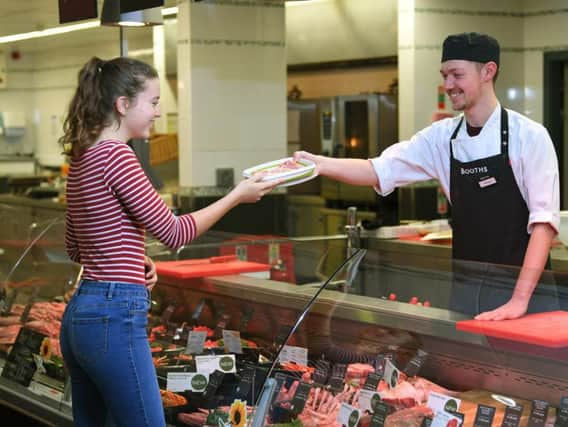

The family-owned grocery chain has launched an initiative encouraging customers to bring their own reusable containers to purchase fresh meat and fish from their counters.
Before the roll out - which is now live at every shop in the chain - products were wrapped in a plastic film and then placed in plastic bag.
Advertisement
Hide AdAdvertisement
Hide AdBooths Brand and Innovations Manager, Matt Bruno said: “We’re constantly striving to become a more environmentally friendly retailer.
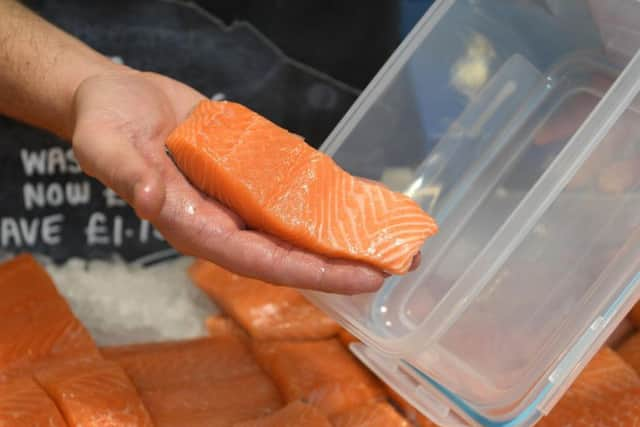

“Enabling our customers to bring their own clean, lidded containers to purchase fresh meat and fish from our counters is a natural progression towards becoming more sustainable.’’
According to research by Space Station, 32 per cent of shoppers say they would prefer to use their own containers to buy and refill fresh food from the supermarkets, ahead of buying pre-packed food, and when asked how they anticipate customers will react, a spokesman for Booths added: “We anticipate that much like the 5p bag tax that our customers will start to begin to bring in containers with their shopping to reduce plastic use.”
In a further bid to phase out single-use plastic, Booths have completely removed plastic cutlery for their takeaway counter products and inside Booths branded pre-packaged food to go options. Bosses hope this move will prevent 500,000 pieces of plastic cutlery being used each year.
The chain is also looking to:
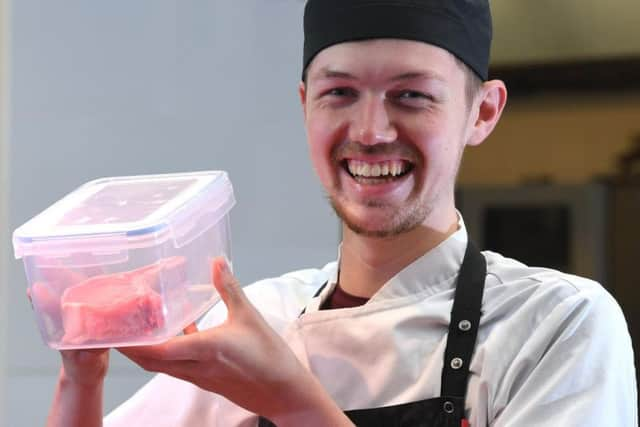

Advertisement
Hide AdAdvertisement
Hide Ad- remove plastic bottles from its cafes, switching over to glass bottles,
- swap plastic straws for paper straws,
- remove loose produce bags, to be replaced with compostable loose produce bags
- introduce reusable cotton net bags for loose produce
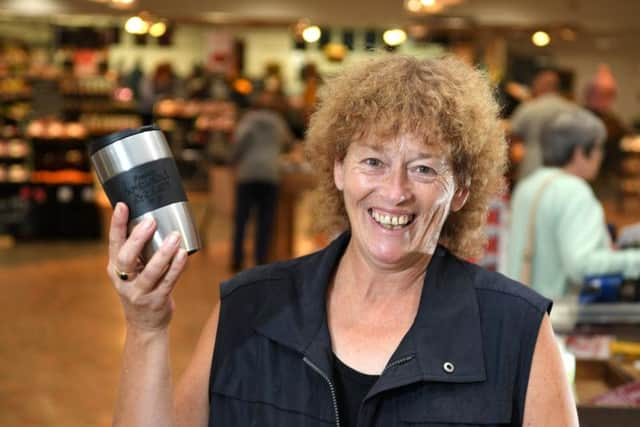

- introduce cardholder savings on selected loose fruit and vegetables
Already some shops have seen the introduction of LED lighting and CO2 fridges which are kinder to the environment, and there has been an increased use of market-style fixtures to encourage shoppers to choose loose fruit and vegetables rather than pre-packed.
Advertisement
Hide AdAdvertisement
Hide AdMany supermarkets have signed up to WRAP’s UK Plastics PACT, an industry initiative designed to change how businesses use plastic - and prevent plastic pollution.
The charity said it was “really pleased” to see supermarkets allowing customers to bring their own containers.
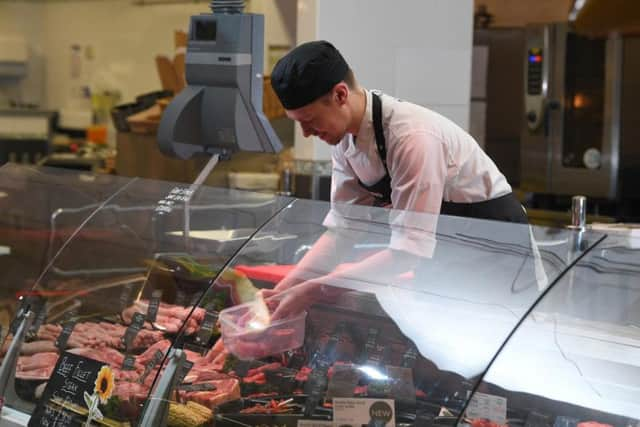

A spokesman for WRAP said: “When we launched The UK Plastics Pact last year, we knew that we had a monumental task on our hands. Tackling plastics pollution remains high in the public consciousness, and citizens quite rightly want to see action from the businesses that put plastic packaging onto our supermarket shelves and into our cafes and restaurants.
“Our members have shown they are up for the challenge, and we have great momentum to propel us forward to transforming forever the way we make, use and dispose of plastic.”
Advertisement
Hide AdAdvertisement
Hide AdMorrisons and Waitrose have been encouraging customers to bring their own containers for some time, and have been encouraged by the feedback from customers.
Morrisons rolled out the container scheme at its meat and fish counters in June 2018 and thanks to the uptake, has recently extended it to its deli counter for cooked meats and cheeses.
The chain claims this has removed 1.8 million meat and fish trays equating to 35 tonnes a year.
In Waitrose, customers can use their own containers at the fish, meat, cheese and deli service counters.
Advertisement
Hide AdAdvertisement
Hide AdAs part of the Unpacked test in Oxford, Waitrose offered a 10 per cent discount for a limited period for anyone buying products from the counters who brought their own containers. As a result, bosses said they saw “a significant increase in service counter sales and the number of people using their own containers in the shop”.
Waitrose & Partners Head of CSR, Health and Agriculture, Tor Harris, said: “Our long term aim is to remove bags completely from our counters or find a suitable alternative for meat and fish in the same way we have with compostable fruit and veg bags, which will be introduced this year.
“We haven’t as yet found that option and know we can’t remove them overnight as there are food safety considerations when handling raw meat and fish and buying food from the counters has become part of many customers’ regular shop.
“The signs, as well as the conversations our Partners are being encouraged to have with customers, are designed to help us work with our customers to start making a difference as soon as possible.”
PANEL: What is the problem with plastics?
Advertisement
Hide AdAdvertisement
Hide AdPlastic is a material made to last forever, yet according to the Plastic Pollution Coalition, 33 per cent of all plastic - water bottles, bags and straws - are used just once and thrown away.
Plastic cannot biodegrade; it breaks down into smaller and smaller pieces.
The campaign group also says problems include:
- Toxic chemicals can leach out of plastic and are found in the blood and tissue of nearly all of us. Exposure to them has been linked to cancers, birth defects, impaired immunity, endocrine disruption and other ailments.
- Chemicals from plastics in landfill drain out and seep into groundwater, flowing downstream into lakes and rivers.
Advertisement
Hide AdAdvertisement
Hide Ad- Plastic attracts other pollutants. Chemicals in plastic which give them their rigidity or flexibility are oily, repelling water but sticking to petroleum-based objects like plastic debris. So, the toxic chemicals that leach out of plastics can accumulate on other plastics.
- Wildlife become entangled in plastic, they eat it or mistake it for food and feed it to their young, and it is found littered in even extremely remote areas.
- Plastic poisons our food chain. Even plankton, the tiniest creatures in our oceans, are eating microplastics. The tiny, broken down pieces of plastic are displacing the algae needed to sustain larger sea life who feed on them.
PANEL: Doesn’t packaging reduce food waste?
According to Greenpeace, which has launched a petition to ‘ditch throwaway plastic packaging’, sometimes, plastic can increase shelf life, but it also increases food waste in other ways.
Advertisement
Hide AdAdvertisement
Hide AdA spokesman said: “When foods are packaged together, they have to be a regular shape and size so they can fit into their plastic container. Food that doesn’t conform to these standards doesn’t make it, which means that some food is rejected before it even reaches the shelves.
“Packaging can also make people buy more than they need. For example if you only need ten tomatoes for your signature homemade salsa but you buy a pack of 16, those last six usually end up mouldy and forgotten on the bottom shelf of your fridge – and eventually get thrown away.”
They added: “Ultimately supermarkets need to reduce the amount of plastic packaging they use in the first place. Sometimes packaging is necessary – pre-chopped fruit and veg are vital for people who have accessibility issues that make chopping and peeling difficult or impossible.
“But the vast majority of plastic is not necessary. Stopping excess plastic at the source will mean that there’s less of it in circulation, and ultimately less plastic in our oceans.”
PANEL: How to correctly store everyday foods
Advertisement
Hide AdAdvertisement
Hide AdThe UK throws away seven billion tonnes of food annually and, on average, around £470 worth of food is wasted per year in each household.
Fruit and vegetables: Keeping fruits and vegetables stored too closely together is a common mistake that can lead to food going bad. Build-up of the chemical compound ethylene will cause them to go off.
Cucumbers: Wash cucumbers straight away and ensure they are thoroughly dry, as excess water will turn them bad.
Citrus: They should be kept in the fridge and, if citrus starts to go on the turn, slicing them up and freezing them will make great ice cubes for drinks.
Advertisement
Hide AdAdvertisement
Hide AdMeat and fish: Meat and fish can be stored in containers in the freezer. Store all frozen food in containers with labels that clearly state the date the items were frozen, as meat should be eaten within three to six months.
Salad: For loose leafy salad, wash and dry in a salad spinner then wrap loosely in kitchen paper and store in plastic boxes to stop the leaves going soggy. Tomatoes and avocados should be stored outside the fridge until ripe.
Onions and potatoes: Onions, potatoes and shallots should be stored in a cool dark place to keep them fresh, such as in a wicker basket in a cupboard or a cellar. Avoid storing these products in plastic bags as this encourages spoilage.
Apples and Bananas: Buy bananas when green and store them away from other fruits in the fruit bowl as they release a gas that can cause other fruits to go off more quickly. Consider using a banana tree to keep them separate and minimise bruising.
Advertisement
Hide AdAdvertisement
Hide AdHerbs: A hack for storing fresh basil and herbs is to chop the leaves in a food processor and place into an ice cube tray with a little olive oil and store in the freezer. When basil is needed for a dish, just pop in a ready-made ice cube.
PANEL: Waitrose ‘Unpacked:
Waitrose & Partners launched an ‘Unpacked’ test in it’s Oxford store in June, and due to the “overwhelmingly positive response”, is running it beyond the original August 18 end date and has committed to introducing elements of the concept into three more shops by the end of the year.
As part of the test, the retailer has taken more than 200 products out of their packaging to test how customers might be prepared to shop differently.
Key features include a refill station, where customers can fill up on 28 different dry products from Waitrose’s own-brand range, such as pasta, rice, grains, couscous, lentils, cereals, dried fruit and seeds from dispensers.
Advertisement
Hide AdAdvertisement
Hide AdAlso in the refill area, the store is offering frozen pick and mix, including mango, strawberries, blueberries, cherries, pineapple and raspberries which can be put into refillable containers.
Wine and beer refillables are also available. Four different wines and four different beers are on tap, manned by “Unpacked advocates”, for customers to take home in reusable bottles, and coffee refills, where customers can grind one of four coffees in store to take home in a reusable container.
Waitrose has partnered with Ecover to provide an automatic detergent and washing-up liquid dispenser where customers will be able to refill their reusable Ecover containers. Shoppers can borrow a box from the store to shop with and then take home before returning on their next visit.
Plastic wrap has been removed from all flowers and indoor plants and replaced with 100 per cent recyclable and 100% PEFC-certified craft paper.
Advertisement
Hide AdAdvertisement
Hide AdUnpacked will now form part of the new look stores to be unveiled in Cheltenham, Gloucestershire, in September and Abingdon and Wallingford, both in Oxfordshire, in November.
Two elements of the trial – the veg kitchen which saw staff preparing vegetables for customers and the ‘borrow-a-box’ option for people instead of bringing their own containers – were not as successful.
Head of CSR for Waitrose & Partners, Tor Harris, said: “The reaction to Waitrose Unpacked has been incredible with the invaluable feedback from thousands of customers giving us the confidence that they are prepared to change how they shop with us.
“We are keen to take the Unpacked concept forward and these additional tests will help us achieve this as well as understand its commercial viability. Through working with our customers and suppliers we will continue to learn and develop ideas which have the potential to be rolled out more widely.”
PANEL: Morrisons
Advertisement
Hide AdAdvertisement
Hide AdAs well as asking customers to bring their own containers in, Morrisons:
- Only buys cotton buds with paper stems rather than plastic ones
- No longer sells 5p single-use carrier bags and has introduced the option of using large reusable paper carrier bags - something they believe can reduce 1,300 tonnes of plastic a year
- Has reduced the weight of packaging used across its Market Street counters by 50 per cent since 2010 (10,000 tonnes).
Advertisement
Hide AdAdvertisement
Hide AdBosses are now working through their own brand products to identify, reduce and remove any unnecessary plastic packaging and say they will be trialling the effect of removing plastic packaging from fruit and vegetables in a number of stores.
Other initiatives include:
- Rolling out loose fruit and veg areas into 60 stores during the course of 2019, offering customers up to 127 fruit and vegetable varieties all in one aisle - making it easy for our customers who want to do a plastic free produce shop
- Completely removing expanded polystyrene from all Morrisons food and drink products in March 2019 (which will remove over 90 million trays equating to 600 tonnes of plastic a year);
- Offering Recycling Points in the entrance of all of its stores for old plastic bags and film;
Advertisement
Hide AdAdvertisement
Hide Ad- Trialling reverse vending machines to incentivise customers to return plastic bottles;
The chain is fitting drinking water fountains will be into new stores and water is already freely available in Morrison’s cafes for customers who want to refill their water bottles.
PANEL: Sainsbury’s
Sainsbury’s were the first UK supermarket to remove plastic bags for loose fruit, vegetables and bakery items from all stores, offering paper and re-usable bags made from recycled materials.
In June, the supermarket chain committed to cutting a further 1,284 tonnes of plastic this year. This includes removing 489 tonnes’ worth of plastic bags, which are currently used for loose fruit, vegetables and bakery items.
Advertisement
Hide AdAdvertisement
Hide AdBy September, paper bags will be available to customers for loose bakery items.
Sainsbury’s has previously implemented measures that are already leading to a reduction of 8,101 tonnes of non-recyclable plastic and “virgin plastic” every year. Its latest efforts bring this total to over 10,000 tonnes.
Sainsbury’s will also remove plastic cutlery from stores as well as:
- plastic trays for asparagus and sweetcorn (144 tonnes)
- plastic lids from cream pots (114 tonnes)
- plastic trays for tomatoes (102 tonnes)
- plastic trays for carrots (38 tonnes)
- plastic sleeves from herb pots (18 tonnes
The company has also committed to replace:
- black plastic trays with recyclable alternatives (6000 tonnes)
Advertisement
Hide AdAdvertisement
Hide Ad- plastic film on fruit and vegetables with a recyclable alternative (2518 tonnes)
- PVC and polystyrene trays with recyclable alternatives (1213 tonnes)
- plastic trays for eggs with a fibre alternative (341 tonnes)
- plastic cutlery for takeaway food with wooden alternatives (38 tonnes)
Advertisement
Hide AdAdvertisement
Hide AdSainsbury’s chief executive Mike Coupe said: “We are absolutely committed to reducing unnecessary plastic packaging in Sainsbury’s stores. Our customers expect us to be leading the way on major issues like this, so I am determined to remove and replace plastic packaging where we can and offer alternatives to plastic where packaging is still required to protect a product.”
PANEL: Asda
Asda is changing the polystyrene bases in its pizzas to cardboard, removing 178 tonnes of plastic from customers’ homes. They are also looking to switch the 2.4 million plastic straws used in its cafes each year to paper. Also by changing coloured drinks bottles to clear plastic, 500 more tonnes of plastic will be recycled.
The chain is going to eliminate single-use coffee cups and plastic cutlery from our its Home Offices and will be launching a ‘zero profit’ reusable coffee cup to help customers reduce their reliance on single use cups.
Single-use carrier bags are also being phased-out completely.
Advertisement
Hide AdAdvertisement
Hide AdAsda president and cheif executive Roger Burnley said: “These aren’t merely long term ambitions – but real, tangible actions we are taking today to reduce our reliance on plastics.”
PANEL: Aldi
A spokesman for the discount supermarket chain said: “Plastic packaging plays an important role in protecting some products from damage, making sure they can be transported easily and helps reduce waste by preserving food for longer.
"However, we are aware of the negative impact that plastic has on the environment and know this is an issue that matters to our customers.
“As a result, we only want to use plastic when we need to and are taking positive steps to reduce the amount of plastic we use.”
The chain said:
Advertisement
Hide AdAdvertisement
Hide Ad- By 2022 Aldi aims for 100 per cent of all own label packaging to be recyclable, reusable or compostable
- By 2025 Aldi aims to achieve 100 per cent recyclable, reusable or compostable packaging across all products
- By 2025 Aldi aims to reduce packaging by 50 per cent (relative to 2015 baseline)
- By 2025 Aldi aims for 50 per cent of its packaging to be made from recycled material
Advertisement
Hide AdAdvertisement
Hide Ad- Aldi is scrapping plastic glitter from its Halloween range as well as Christmas cards and wrapping paper this year.
Aldi removed all single-use plastic bags from its stores at the end of 2018 and has established a Packaging Task Force with its buying teams and external experts to deliver these goals.
In principle Aldi supports a Deposit Return Scheme for plastic bottles and is conducting a feasibility study into how it could implement such a scheme.
PANEL: Tesco
In July, Tesco announced it will stop using carrier bags to deliver groceries from its online business. The move will mean that 250 million fewer carrier bags will be delivered to customers’ homes each year and nearly 2,000 tonnes of plastic will come out of production annually.
Advertisement
Hide AdAdvertisement
Hide AdDelivery drivers will be ready to offer customers a helping hand with the changes by taking groceries out of the reusable trays and into customers’ kitchens.
By the end of the year, Tesco will also have removed the hardest to recycle materials from its own brand packaging. As a result, 570 more products now have widely recyclable packaging, and around 3,000 tonnes of ‘bad’, hard-to-recycle, plastics have been removed in the process.
The chain has also collected 250,000 bottles through it’s ‘reverse vending machines’. The plastic bottles returned by customers are now being used in a closed loop, recycled for new Tesco drinks.
Tesco Quality Director, Sarah Bradbury said: “We’re looking for ways to reduce the amount of plastic we use. We know it’s an important issue for customers, colleagues and our business and we know we have to do more.
Advertisement
Hide AdAdvertisement
Hide Ad“Removing carrier bags from our online shopping is one of the many ways we are making changes to help customers reduce their use of plastic.
“Right now, we’re reviewing all our packaging, including plastic, looking to remove where possible. Where it’s not right to remove we will reduce, help customers reuse and ensure all packaging can be recycled. Our scale means a simple, straightforward change can have such a big impact.”